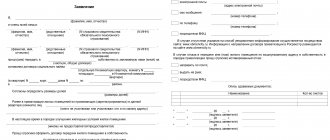Home / Housing disputes / Privatization of housing, apartments under a social tenancy agreement
Municipal housing is not the property of citizens. But as soon as a person privatizes an apartment, he will become a full owner. This gives him the right to dispose of the housing as he pleases: sell, rent, donate, bequeath, or include as collateral. But these actions are still a long way off - first you need to make a request to the administration, prepare documents, visit several authorities and register ownership in the Unified Real Estate Register.
The procedure for privatizing housing under a social tenancy agreement should be approached extremely carefully. The opportunity to own a home is given to a person only once in his life. Therefore, before starting the procedure, it is necessary to weigh the pros and cons. Otherwise, there is a high risk of making an unfavorable deal. Let's try to figure out what privatization of municipal housing is and when is it worth taking advantage of this chance?
At the same time, can you find out what steps the privatization of an apartment consists of?
✅ What is social housing rental?
Let's start with the definition of the concept of "social housing housing" or simply a municipal apartment - this is real estate that belongs to the state, but is transferred to citizens on the basis of a social rental agreement . According to the law, the apartment is occupied by the tenant and members of his family, i.e. registered persons, and not just relatives (Clause 1, Article 60 of the RF Housing Code).
Residents are responsible for paying utility costs. Usually an apartment is registered for one person - it is he who pays the personal account. But there is a situation where utility bills are divided among several residents.
The housing stock for social rent consists of the following objects:
- Municipal apartments and their parts.
- Separate rooms.
- Private houses and their parts.
Municipal housing cannot be considered real estate that does not have precise boundaries in area. This includes, for example, public rooms.
Legislative norms
The regulations for the privatization of housing are contained in the Law of the Russian Federation No. 1541-1.
According to this law, housing provided for rent in this way is included in the list of real estate objects subject to registration as property free of charge.
The contract includes everyone registered in the living space , including minors. If, at the request of the tenant, outsiders moved in during the term of the agreement, they are recognized as members of the tenant’s family, are included in the documentation and receive a share in the living space.
The area of the premises is divided into equal parts (shares) among all those registered in it. Persons who previously participated in privatization do not receive a share in this premises.
The right to re-participate in the process is given to persons who previously took part in the process under 18 years of age, as well as citizens who have deprivatized previously registered housing (Decision of the Committee on Commercial Economy No. 15).
The privatized property must be included in the list of buildings subject to transfer into the ownership of citizens. If it is located in a dilapidated building, has departmental status or is part of a reserve fund, it cannot be privatized.
Registration of real estate ownership from the Ministry of Defense has some features. Its registration requires removal of its official (departmental) status. This procedure is carried out with the participation of the Ministry of Defense and requires additional documentation.
Read about the procedure for deprivatization of residential premises in our article. Also find out about the statute of limitations for invalidating a procedure.
What is the procedure for privatization under a social tenancy agreement?
✅ Is it possible to privatize social housing?
All-Russian housing privatization allows you to formalize the transfer of ownership of an apartment from the state to individuals. Is it possible to privatize municipal housing? This can and should definitely be done . Recent changes in housing legislation favor this process.
The approval of Federal Law No. 14 of February 22, 2017 made the privatization of housing in Russia indefinite. And if earlier people waited for the end of the next stage of privatization in the hope of extending the period, now everything is much simpler.
❌ Which apartments are not subject to privatization
There are several categories of housing that cannot be privatized:
- official;
- in closed military camps;
- emergency premises or housing for demolition;
- apartment-museums.
Difficulties may arise with housing in which major redevelopment has been carried out without obtaining permits from the relevant authorities.
After completion of the privatization process, the owner can dispose of the housing at his own discretion: sell it, transfer it by inheritance. The only difficulty that may arise is several participants in the process with whom everything needs to be coordinated.
✅ Conditions, grounds
| Who is eligible | Who doesn't have the right |
| The employer is the main participant in privatization. He will have to prepare documents for all family members. However, in some cases it is necessary to prove that privatization is justified. The main confirmation is living in an apartment for social rent for a long time. | Those participating in privatization again Privatization is available once in a person’s life (Article 11 of Federal Law No. 1541-1 “On Privatization...”). This means that you cannot participate in it again. Moreover, if a citizen takes advantage of his attempt and then decides to return the apartment to municipal status, he will be denied deprivatization. The attempt is considered to be exhausted. |
| Members of the tenant's family (spouse, children, parents) have the right to privatize housing for social rent if they are registered in the apartment. Along with privatization, refusal of the procedure is also allowed, for example, a grandmother writes a refusal in favor of her newly born grandson. | Persons not registered in the apartment It happens that the tenant moves third parties in with him. In this case, registration is not issued - people simply live in the apartment. If privatization of the said housing begins, such persons will not be able to receive a share. Persons not registered in the apartment are not family members of the tenant. |
| Minors (repeatedly) An exception to the rules for adults are children participating in the privatization of an apartment under 18 years of age. Despite using their chance, they have the right to re-privatize housing for social rent after 18 years. | Residents under a sublease agreement The agreement is concluded between the tenant of the residential premises and the new tenant for a certain period. Let's imagine a situation: an employer and his family are going on vacation. To prevent the premises from being empty, they can move another family there by concluding a paid sublease agreement with them. New residents will only be able to live in the apartment, but will not have the right to participate in the privatization of housing for social rent. |
| Low-income Confirms the status of those in need of separate housing. The state is actively meeting these categories of citizens halfway. A simplified procedure allows you to privatize a municipal apartment in a few weeks. But you will need to collect documents and make a request to Social Security. | |
| Military personnel have the right to privatize a service apartment if they receive permission to transfer it to the status of municipal housing. To do this, you need to contact the leadership of the military unit and receive an order for privatization. Next, the procedure takes place in court. Only after receiving a court order can such an apartment be privatized according to the general procedure. If military personnel are registered in the apartment, but are serving in the army, they will also be able to take part in privatization. | |
| Convicts If a person is registered in a municipal apartment, but is in prison, he does not lose the right to privatization. To do this, you need to write a statement of consent. The documents can be collected by the relatives of the convicted person or the tenant of the premises. |
Additional documents for minors
If minors legally reside in the apartment, additional documents from the following list will be required:
- Birth certificate for each child. If the child is still a minor, but already has a passport, then his passport is needed. As is the case with similar documents of adult residents of housing, it is recommended to make copies of all pages in advance.
- Permission to participate in privatization from the guardianship authorities. This document is needed for all parents, even if they are divorced. However, it is not required if one or both parents have been deprived of their parental rights. Also, such a document is required by official guardians. The validity period of the paper is not limited, but it takes about 2 weeks to receive it, so you need to ensure that you receive it in advance.
- Documents confirming the fact of guardianship (if the role of parents is performed by a guardian). These may be orders from the guardianship authorities.
- Certificate from previous place of residence.
- Death certificate of those residents who previously lived in this premises and had the right to privatize the property.
✅ Pros and cons
| Advantages of housing privatization (social rent) | Disadvantages of housing privatization (social rent) |
| Full and sole right to dispose of real estate: sell, rent, include as collateral, bequeath to relatives, donate, exchange, etc. | Obligation to pay real estate tax (0.3% of the cost of the apartment) |
| An apartment owner cannot be evicted for debts to housing and communal services. | Increase in utility bills |
| Opportunity to remodel your home | Paying for major repairs and restoration of the house from your own pocket |
What takes the most time?
An examination of the privatization procedure shows that, although it is troublesome, it is relatively short-lived. Thus, the answer to the question “How to quickly privatize an apartment?” - do not put off going to the authorities for too long. If you do not delay collecting and submitting documents, then by the end of the third month your apartment will be privatized.
In addition, according to the law, you can only privatize an apartment once. What takes the most time is the execution of an apartment transfer agreement (privatization agreement) - this period can even be two months, but in practice, it is usually completed in a few weeks.
To take part in the privatization ending in 2021, citizens must hurry to exercise their legal right.
The entire procedure takes several months, but the deadline will not be missed if the documents are submitted before March 1, 2021, even if the owner receives the certificate of title itself later.
Read about what rights an apartment owner receives, what taxes he is required to pay and what responsibilities he bears in the articles on our website.
✅ How to privatize housing under a social tenancy agreement
The state provides citizens with housing on the right of indefinite use. As soon as the tenant dies, the municipal apartment returns to the state. This process can be easily corrected by registering ownership of housing for social rent.
Don’t know how to privatize a house along with a plot of land? Step-by-step instructions are on our website.






